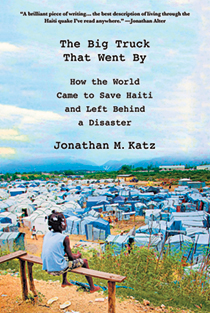Book review: The Big Truck That Went By: How the World Came to Save Haiti and Left Behind a Disaster
By Jonathan M. Katz
Share
 Julian Fantino, Canada’s minister in charge of the Canadian International Development Agency, recently wondered why Haiti, with so many unemployed, is covered in garbage—despite all the aid money that has poured into the country since its devastating 2010 earthquake. He would probably learn a lot from this book.
Julian Fantino, Canada’s minister in charge of the Canadian International Development Agency, recently wondered why Haiti, with so many unemployed, is covered in garbage—despite all the aid money that has poured into the country since its devastating 2010 earthquake. He would probably learn a lot from this book.
Let’s start with the garbage. Even today, the drainage canals of Port-au-Prince are clogged with empty water bottles sent by international donors. Haitians never lacked water; they lacked the means to purify the water they already had. But cargo planes unloading bottles look good on television, so in they came. Haitians received a lot of other things they didn’t need from the outside world: food that undermined domestic production, Hollywood celebrities, cholera.
What Haiti didn’t get—at least if we’re talking about its government—was cash. Much of the money that was pledged was never delivered. Millions of so-called aid dollars were in fact debt relief. And many millions more went to the UN, or NGOs, or never left the donor countries at all. It went to pay for things like hotel rooms, and SUVs.
The reason usually given for bypassing governments in recipient countries is that they’re crooked. Last month, CIDA blamed the slow progress of development in Haiti on “weak governing institutions and corruption.” Asked for examples of corruption, CIDA cited Transparency International’s Corruptions Perception Index—which measures perceptions of corruption rather than instances of it, and which Katz persuasively discredits.
More importantly, by the end of 2010, the Haitian government had received only one per cent of money spent, about $24 million. Neither CIDA nor Canada’s Department of Foreign Affairs gave any money at all to Haiti’s government. Even if Haitian politicians had stolen everything they could—and there’s no evidence they did—it wouldn’t have made a visible difference. But by not funding a government that might actually be accountable to Haitians—instead of NGOs that are not—donor countries weaken that government in the eyes of its citizens. They too see the garbage and blame their politicians who lack the resources to do anything about it. This is a heartbreaking book.
Visit the Maclean’s Bookmarked blog for news and reviews on all things literary